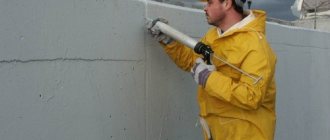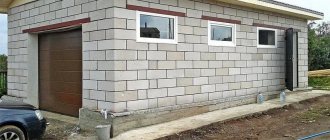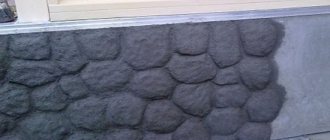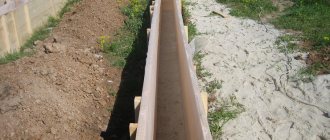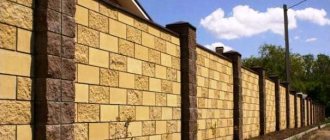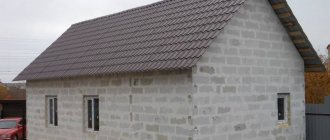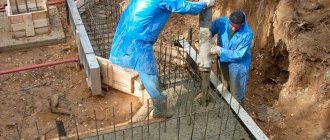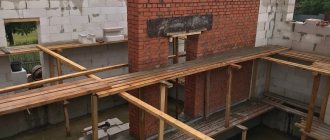Cinder blocks, foam blocks, gas silicate blocks are modern materials that have a number of advantages over traditional materials intended for wall construction.
They are light and yet large! That's why it's so nice to work with them. Building a house from foam blocks is much faster than from brick.
Ash, slag, broken bricks, concrete - all this is part of modern foam blocks.
However, the composition largely depends on the manufacturer.
Depending on the composition, foam blocks have different densities.
Foam blocks also have a lot of disadvantages. The material does not hold heat well, does not like excessive moisture, and has problems with strength compared to brick.
However, if used correctly, houses made of foam blocks are no worse than brick ones.
Cinder block walls are not difficult to dismantle, again in comparison with more durable ones, concrete and brick.
Types of foam concrete
In addition to the classic composition of foam concrete, there are blocks to which various additives are added that help improve the characteristics of the material.
- Polystyrene concrete. Foam chips are added to this material during production;
- Expanded clay concrete. Expanded clay is added to this material during production;
- Arbolite (wood concrete). Wood shavings are added to this material during production;
- Fiber foam concrete. Fiber fibers are added to this material during production.
Removing the ceiling
| Service | Price per m2 |
| Removing a plasterboard ceiling | 210 rub/m2 |
| Suspended ceiling "Grigliato" | 115 RUR/m2 |
| Suspended ceiling "Armstrong" | 95 RUR/m2 |
| Multi-level suspended ceilings made of gypsum plasterboard | 250 rub/m2 |
| Removing plaster from the ceiling | 270 RUR/m2 |
| Ceiling made of plastic panels | 90 rub/m2 |
| Ceiling made of lining | 95 RUR/m2 |
| Removing the rack ceiling | 75 RUR/m2 |
| Cleaning the ceiling from whitewash or paint (water-soluble) | 170 rub/m2 |
| Grinding a concrete ceiling (paint+putty+whitewash) | 330 rub/m2 |
| Removing acrylic paint from the ceiling | 330 rub/m2 |
| Removing oil paint from the ceiling | 330 rub/m2 |
| Cleaning the ceiling from putty (manual) | 185 RUR/m2 |
| Removing stucco from the ceiling | 165 RUR/m2 |
| Dismantling a stretch ceiling | 95 RUR/m2 |
| Removing wallpaper from the ceiling | 95 RUR/m2 |
| Joining interpanel concrete joints | 150 rub/m2 |
Density of foam concrete
There are four types of foam concrete, which differ in density. The forces required to demolish walls made of foam blocks also depend on this.
Structural porous blocks – D1300-1600. Density is 1300 - 1600 kg/m3. This type of foam concrete is not mass-produced, therefore its characteristics are not regulated by GOST. Buildings with no restrictions on the number of storeys can be erected from blocks of this density.
Structural foam blocks – D900-1200. Density is 900 - 1200 kg/m3, weight 39-47 kg, standard size. A very durable block with good compression resistance, but requires additional insulation. Multi-storey construction is allowed.
Structural thermal insulation blocks – D600-800. Density is 600 - 800 kg/m3, weight 23-35 kg, standard size. The most balanced type of foam blocks - they have sufficient strength for the construction of load-bearing walls and have an optimal level of thermal insulation. They are actively used in low-rise private construction.
Thermal insulation blocks – D300-D500. Density is 300 - 500 kg/m3, weight 11-19 kg, standard size. Due to the large number of pores in the structure of the block and, accordingly, high air saturation, they have low thermal conductivity. But they have low strength, therefore, they are used only as a heat-insulating layer.
In fact, although density plays a role during dismantling, regardless of it, dismantling walls made of foam blocks is not so difficult, so you should not pay much attention to density.
In this case, the foam blocks are covered with a layer of plaster; its separate installation is not necessary. Skip this point and go straight to dismantling the walls.
Features of the work
Even if you don’t have a power tool at hand, you can cope with the dismantling of a foam concrete wall using available tools:
- sledgehammers;
- saws;
- hammer.
But if there is a backfill in the wall in the form of reinforcing bars, you can’t do without a grinder. With its help, metal elements are sawn into separate fragments.
The most difficult step will be removing the top row. It will need to be broken, but all subsequent rows can be easily disassembled by separating the blocks from each other using a regular chisel. This recommendation is correct if the masonry was done with glue. You can even simply saw the wall. For this, a hacksaw with carbide teeth is used. If the inter-row coupling turns out to be too strong, you need to use a hammer drill with a chisel attachment. The master must use it to influence the seams, breaking the solution.
If you need to disassemble a wall without damaging individual blocks, you should arm yourself with a hammer and chisel. Cement or glue joints must be carefully broken, after which you can proceed to loosening the blocks. If the products remain in place and cannot be moved, you need to tap the surface of the block with a rubberized sledgehammer. The impact should fall on the central part of the foam block.
If there is a finishing on the surface of the wall in the form of painting, it is recommended to remove it first, since otherwise the seams will not be visible, and it is they that should bear the main impact. The work will go faster if you have a hammer drill. With its help you can cope with the removal of the top row. The further plan will depend on the strength of the solution.
You can continue working using the same tool, but a grinder will do the job just fine. It is supplemented with a diamond wheel or a wheel for concrete. You should go along the seams, if necessary, periodically changing the tool with a hammer and chisel.
It is very convenient that the partition has access from both sides. Using a hammer drill with a spatula, you can initially clean out all the seams in the masonry, starting at the top and gradually moving down. There is no point in partially dismantling the wall. Once all the seams have been processed on both sides of the wall, the foam blocks can be removed manually, and most of them will not be damaged, allowing the material to be reused.
Dismantling walls made of foam blocks
In ordinary cases, when you need to demolish a small section of a wall, or an entire wall, you don’t even need special tools.
It is worth remembering, of course, that the walls should not be load-bearing in the first place, otherwise such walls cannot be demolished.
To dismantle walls made of foam blocks, you will need the following tools:
- Respirator.
- Gloves.
- Drill.
- Sledgehammer.
- Saw.
- Hammer.
Initially, it is necessary to mark the walls so as not to make mistakes during dismantling.
Dismantling of foam blocks must be done from top to bottom.
Protective means
Since the described process will be accompanied by the formation of a large amount of dust and debris, workers should use personal protective equipment. The work will require:
- protective clothing;
- gloves;
- helmet;
- respirator;
- protective glasses.
To prevent the broken blocks from interfering with further work, they should be put in bags and taken out of the apartment.
What you need to know before dismantling walls
In order to dismantle the walls, you must obtain the appropriate permission for demolition and redevelopment. For these purposes, you will need to make adjustments to the design documentation.
It is worth understanding that load-bearing walls cannot be demolished and no one will issue you a permit for this work.
Load-bearing walls distribute the load, so their demolition can lead to partial destruction of your home.
Before carrying out dismantling work, you should turn off:
- gas supply;
- water supply;
- heating, if the radiators can be switched off;
- electricity.
Removing the floor
| Service | Price per m2 |
| Dismantling reinforced concrete screed up to 5 cm | 320 rub/m2 |
| Dismantling concrete screed from 5 to 7 cm | 380 rub/m2 |
| Dismantling concrete screed from 7 to 15 cm | 490 RUR/m2 |
| Removing cement floor screed up to 5 cm | 220 rub/m2 |
| Removing cement floor screed from 5 cm and above | 270 RUR/m2 |
| Dismantling self-leveling floor | 220 rub/m2 |
| Asphalt dismantling | 250 rub/m2 |
| Dismantling a wooden floor on joists (from boards) | 220 rub/m2 |
| Dismantling panel parquet floors (with joists) | 220 rub/m2 |
| Cleaning the screed from glue | 360 rub/m2 |
| Dismantling old parquet and laminate | 100 rub/m2 |
| Removing tiles and porcelain tiles from the floor | 170 rub/m2 |
| Removing tile adhesive | 130 rub/m2 |
| Dismantling the baseboard | 50 rub/m2 |
| Dismantling hardboard with mastic | 290 RUR/m2 |
| Cleaning the floor from bitumen mastic | 400 rub/m2 |
| Removing linoleum, carpet | 90 rub/m2 |
| Cleaning glue from the floor after removing linoleum | 350 rub/m2 |
| Dismantling the old backing, plywood with glue | 190 rub/m2 |
| Dismantling waterproofing | 90 rub/m2 |
| Cleaning slag backfill (coal dust) into bags | 900 rub/m3 |
Why do businesses and organizations choose us?
We will take care of all the procedures for obtaining permission to carry out dismantling. Upon completion of the work, dismantlers subsequently remove concrete elements, scrap metal, construction waste, and large elements of buildings for further disposal or recycling. Promptly and with maximum responsibility.
We guarantee the quality of the work performed and compliance with the dismantling deadlines specified in the legal contract. Focused on long-term relationships with clients - discounts are provided for regular customers. At the request of the client, during the work process it is possible to provide photo reports at any stage.
Additional benefits of working with us:
- Many years of experience in construction and dismantling work.
- We always take the task at hand seriously – we take even the smallest details into account.
- We ourselves select the appropriate tools and special equipment for tasks of any scale - we find and rent everything necessary to start work as quickly as possible.
- Before starting work, we discuss all the nuances with the client.
- All design calculations are carried out by experienced engineers carefully and accurately - our specialists are not afraid of difficulties.
- The estimate will not change upward until the work is completed - provided that the number of tasks remains unchanged.
- We begin dismantling as quickly as possible, immediately after signing the contract - we regularly check the quality of the work performed by our employees.
- The teams employ Slavic craftsmen without bad habits - responsible performers with extensive work experience, never any problems.
- We will definitely meet the agreed time - even if this requires bringing additional craftsmen or builders to the site.
- With us you save your finances - affordable, reasonable prices.
You can order an appraiser to visit the site by calling our managers at the specified number or contact us by leaving a request by filling out the feedback form, we will call you back right away. We offer convenient payment options for services and mutually beneficial terms of cooperation. Works on full and partial prepayment, non-cash and cash payments. We will definitely initiate the conclusion of an agreement with the client. The final estimate with a list of necessary work is approved with the customer. The final price depends on the features, volume, complexity and urgency of the task. Exclusive conditions are provided for regular customers and pensioners.
Still have questions? Or do you want to clarify the cost of completing a task? You can send your project to us by email for calculation. Or we’ll come and evaluate everything ourselves on the spot. Call, consultation on any related aspects and provision of detailed information is free. The operator is always available during business hours. We work directly without intermediaries and contractors. Examples of our work are presented in the catalog on the website. You can entrust us with any task. Let's consider your proposals for cooperation. Our clients are always satisfied, come back again and recommend us to their colleagues!
Remodeling a room using foam blocks
I want to change the interior, the owners of residential meters resort to methods that radically change the appearance of the room. Some demolish partitions and install a sliding system, while others, on the contrary, build walls and zone large rooms. Any of the methods is acceptable, and owners who decide to redevelop an already finished area can turn any design ideas into reality. Some enterprising owners decide to install it themselves, but Angate recommends redevelopment be done together with specialists.
Decorative foam block partitions are:
| Classic version | They are created for the purpose of completely zoning a room, with blank partitions. Most often they look like an ordinary wall with an opening for a door. The decoration is a door leaf of various configurations. |
| Multi-level partition | The appearance resembles a side view of steps. It is carried out for the purpose of storing things, figurines or books in it. |
| Designer | The partition can be made with rectangular, wavy or rounded elements. The lighting located inside is used as decoration. |
| Combined | Quite often, combined partitions using glass blocks are used to separate the bathroom and toilet in houses. |
| Partition arch | Foam block is used to create arched openings. |
Foam block partitions are of the highest quality along with other materials. In addition to their durable composition, solid structures have high noise insulation and low heat transfer. The external appearance of the building can take on any color and any possible design. Dismantling aluminum partitions at a price largely depends on the size of the product and the presence of movable components.
Demolition of brick walls according to the technological map
A standard technological map - TTK is drawn up to prevent force majeure situations during the work process. Demolition of brick walls along the Third Transport Ring will allow you to avoid damage to the floor and ceilings during the work. Basically, a sledgehammer is used in the work, but if the wall is not prepared properly, it is difficult to control the size of the destroyed area.
To carry out the work accurately, it is recommended to drill holes, highlight a certain area and dismantle it with a hammer. When working with a brick wall, you can use the technology of removing mortar from the seams. A faster way is to use a hammer drill, but its disadvantage is the high noise level during work.
Dismantling of openings, blocks
| Service | Price per m2 |
| Cleaning window slopes from plaster (up to 50 mm) | 230 rub/m. |
| Cleaning door slopes from plaster (up to 50 mm) | 200 rub/m. |
| Removing the door block | 290 RUR/piece |
| Dismantling window blocks and window sills (wooden) | 440 rub/piece |
| Disassembling doors with frames | 390 RUR/piece |
| Dismantling a concrete window sill | 790 rub/m. |
| Air conditioner dismantling | 590 RUR/piece |
| Dismantling ventilation | 190 rub/m. |
| Dismantling of built-in wardrobes, niches, sliding wardrobes and mezzanines | 490 RUR/piece |
| Disassembling the kitchen unit | 1480 RUR/piece |
Types of dismantling work
Dismantling may be required to expand one-room premises, when performing redevelopment of two-room apartments, multi-storey country houses, commercial buildings, hotels, restaurants, and other real estate. It is carried out before the start of complex or designer renovations in new buildings, boarding houses, and panel buildings. Clearing the area with a bulldozer may be necessary to level it for digging a pit and further construction.
If the need arises, the area is temporarily fenced. It is possible to erect a fence around the perimeter.
- Dismantling of water pressure and shut-off valves, dishwashers, washing machines, dishwashers.
- Dismantling of electric stoves, cables, switchboard equipment. Services are in demand if there is a need to modernize the network.
- Removing paint, finishing mixtures, primers, mortars or decorative coatings from walls, processing and preparing surfaces for repairs, for example, for plastering or wallpapering. Cleaning of walls and ceilings, rough or fine finishing.
- Dismantling of windows, doors and other types of facade structures. It is possible to preserve frames and glass.
- Destruction of emergency walls, foundations, concrete barriers, flights of stairs and ceilings of multi-storey buildings.
- Dismantling of air ducts, water pipes, cable ducts, heating systems and other engineering lines, internal or external communications that have critical damage.
- Removal of floor coverings, laminate, linoleum, parquet, ceramic tiles for pouring screed.
- Dismantling of insulation made of gypsum fiber, expanded polystyrene, mineral wool, polystyrene foam.
- Dismantling of machines and units, taking into account their specifics and condition. We disassemble into parts specified by the client with the possibility of subsequent assembly. Preliminary disconnection of power and grounding is carried out by an experienced electrician. Next, the wiring is dismantled.
Dismantling is carried out using professional tools and equipment. To carry out the work, it is assumed that there is sufficient free space on the site and the ability to connect the equipment to a three-phase power supply.
Quick dismantling of an office partition
Any work on dismantling partitions, regardless of the material from which they are made and its purpose, is carried out in a room cleared of furniture.
If acrylic or triplex was used as the filling material for the structure, the frame is weakened. All cables and wiring must be dismantled, switches and sockets removed.
The fixing fastenings of the frame to the surface of the floor and ceiling are weakened. Carrying out work in this way allows you to save the dismantled partition and use it again.
Features of dismantling glass partitions
Glass partitions can be of two types: enclosed in a metal profile
or built from glass blocks.
In terms of work execution, the first ones are easier to demolish. In most cases, the dismantling of glass partitions in offices and residential premises is carried out while preserving the filling.
Before demolishing the glass wall, it must be marked - this will simplify the work on subsequent installation. To remove the glass, you need to loosen the profile fastenings. If the wall was mounted using self-tapping screws, it is more convenient to dismantle it using a screwdriver.
Electrical dismantling
| Services | Price per m2 |
| Dismantling of sockets, switches, lamps | 90 rub/piece |
| Dismantling of lamps, sconces, chandeliers | 125 rub/piece |
| Dismantling electrical wiring (cable) | 45 rub/m. |
| Removing the built-in electrical panel | 350 rub/piece |
| Dismantling the split system | 790 RUR/piece |
| Removing cable channels (ducts) | 33 rub/m. |
Dismantling of plumbing
| Services | Price per m2 |
| Dismantling a cast iron bathtub with removal | 1280 RUR/piece |
| Jacuzzi (without saving) | 1490 RUR/piece |
| Heated towel rail | 280 rub/piece |
| Technical cabinet | 360 rub/piece |
| Complete slate sanitary cabin | 12800 rub/piece |
| Complete plaster sanitary cabin | 15900 rub/piece |
| Sancabin pallet made of concrete (reinforced concrete) | 2300 rub/piece |
| Heating radiator (battery) | 4430 RUR/piece |
| Washbasin, sink, sink | 330 rub/piece |
| Toilet, bidet | 270 rub/piece |
| Tap, mixer | 90 rub/piece |
| Dismantling of PVC pipes | 35 rub/m. |
| Water supply pipes up to 5 cm | 130 rub/m. |
| Cast iron pipes (sewerage) | 330 rub/m. |
| Gas stoves, boilers, water heaters, boiler | 380 rub/piece |
| Dismantling of metal structures | 3480 rub/t |
| Removing the shower cabin | 390 RUR/piece |
What do you need to consider when demolishing a timber frame?
Please note: first of all, the crossbars, which are the main part of the frame, are dismantled. Only after this can you begin to release the racks.
The floor and ceiling piping are dismantled last. When demolishing a wooden frame, similar work is performed in the same sequence, with the exception of the disassembly technology.
Depending on the material of the beam connection, it is weakened accordingly. The wooden tenons are unscrewed and the metal studs are loosened using a pry bar.
Preserving a wooden frame after dismantling is problematic, since loosening the tenon joints often deforms the timber.

